

Preventing The Next Catastrophe: Where Do We Stand? Guest post by David Romer University of California, Berkeley, and co-host of Rethinking Macro II: First Steps and Early Lessons (Versions in 中文, 日本語, and Русский) As I listened to the presentations and discussions, I found myself thinking about the conference from two perspectives.
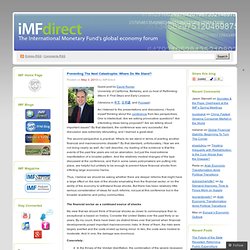
One is intellectual: Are we asking provocative questions? Are interesting ideas being proposed? Are we talking about important issues? The Lessons of the North Atlantic Crisis for Economic Theory and Policy. Guest post by: Joseph E.
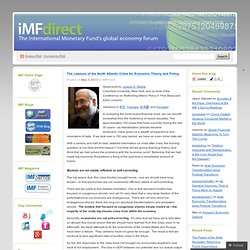
Stiglitz Columbia University, New York, and co-host of the Conference on Rethinking Macro Policy II: First Steps and Early Lessons (Versions in 中文, Français, 日本語, and Русский) Sorry, Economists: The Crisis is a Huge Problem for Your Discipline. I recently stumbled upon a reddit post called ‘A collection of links every critic of economics should read.‘ One of the weaker links is a defence of economists post-crisis by Gilles Saint-Paul.
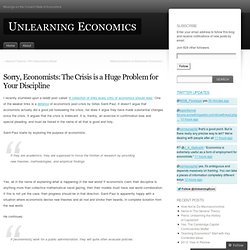
It doesn’t argue that economists actually did a good job foreseeing the crisis; nor does it argue they have made substantial changes since the crisis. It argues that the crisis is irrelevant. It is, frankly, an exercise in confirmation bias and special pleading, and must be fisked in the name of all that is good and holy. Saint-Paul starts by exploring the purpose of economists: If they are academics, they are supposed to move the frontier of research by providing new theories, methodologies, and empirical findings. Yes, all in the name of explaining what is happening in the real world! He continues: If [economists] work for a public administration, they will quite often evaluate policies.
Hopefully ones that prevent or cushion financial crises, surely? Saint-Paul charges critics with: What Really Happened. The effusion of books about the 2007-08 financial crisis has mostly run its course.
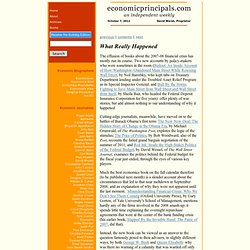
Two new accounts by policy-makers who were sometimes in the room (Bailout: An Inside Account of How Washington Abandoned Main Street While Rescuing Wall Street, by Neil Barofsky, who kept tabs on Treasury Department lending under the Troubled Asset Relief Program as its Special Inspector General; and Bull By the Horns: Fighting to Save Main Street from Wall Street and Wall Street from Itself, by Sheila Bair, who headed the Federal Deposit Insurance Corporation for five years) offer plenty of war stories, but add almost nothing to our understanding of why it happened Much the best economics book on the fall calendar therefore (to be published next month) is a slender account about the circumstances that led to that near meltdown in September 2008, and an explanation of why they were not apparent until the last moment. But Gorton, 61, possesses several advantages that Kindleberger (1910-2003) did not.
What have the economists ever done for us? There is a long list of culprits when it comes to assigning blame for the financial crisis.
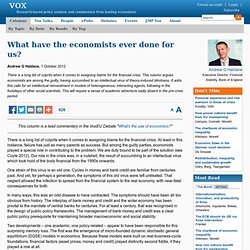
This column argues economists are among the guilty, having succumbed to an intellectual virus of theory-induced blindness. It adds this calls for an intellectual reinvestment in models of heterogeneous, interacting agents, following in the footsteps of other social scientists. This will require a sense of academic adventure sadly absent in the pre-crisis period. This column is a lead commentary in the VoxEU Debate "What's the use of economics? " There is a long list of culprits when it comes to assigning blame for the financial crisis. One strain of this virus is an old one. In many ways, this was an odd disease to have contracted. Two developments – one academic, one policy-related – appear to have been responsible for this surprising memory loss. Part XI: Predicting the Crisis. As many readers of this blog will know, Steve Keen is generally the economist credited with best foreseeing and warning about the 2008 financial crash.
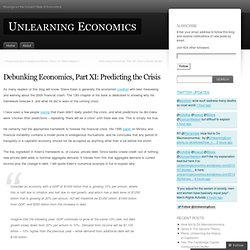
The 13th chapter of his book is dedicated to showing why his framework foresaw it, and what he did to warn of the coming crisis. I have seen a few people saying that Keen didn’t really predict the crisis, and what predictions he did make were ‘chicken little’ predictions – repeating “there will be a crisis” until there was one. This is simply not true. He certainly had the appropriate framework to foresee the financial crisis. His 1995 paper on Minsky and financial instability contains a model prone to endogenous fluctuations, and he concludes that any period of tranquility in a capitalist economy should not be accepted as anything other than a lull before the storm. James K Galbraith - Who are these Economists, Anyway? Economic theory and the crisis. “A new scientific truth does not triumph by convincing its opponents and making them see the light, but rather because its opponents eventually die, and a new generation grows up that is familiar with it.
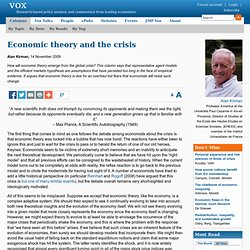
. ” – Max Planck, A Scientific Autobiography (1949) A Missing Macroeconomic Playbook? I am reminded of the extraordinary gulf between economics as I see it and economics as at least some others see it when I read things like Narayana Kocherlakota's opening paragrapb: Modern Macroeconomic Models as Tools for Economic Policy: I believe that during the last financial crisis, macroeconomists (and I include myself among them) failed the country, and indeed the world. In September 2008, central bankers were in desperate need of a playbook that offered a systematic plan of attack to deal with fast-evolving circumstances. Macroeconomics should have been able to provide that playbook. It could not. Of course, from a longer view, macroeconomists let policymakers down much earlier, because they did not provide policymakers with rules to avoid the circumstances that led to the global financial meltdown...
My reaction to this is the old one: "Huh?! " For "macroeconomics" did and does have a playbook that offered a systematic plan of attack to deal with fast-evolving circumstances. Oh.